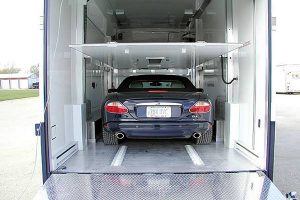Understanding Enclosed Shipping
Understanding enclosed shipping involves delving into a specialized method of transporting vehicles that prioritizes protection and security. Unlike traditional open transport, where cars are loaded onto open-air trailers, enclosed shipping utilizes fully covered trailers to shield the vehicle from external elements. This type of shipping is particularly valuable for high-end, classic, or delicate vehicles that could be susceptible to damage from weather conditions, road debris, or other environmental hazards.
Enclosed shipping provides a cocoon-like environment for the vehicle, ensuring it remains in pristine condition throughout the journey. The trailer itself is typically constructed with robust materials designed to withstand various stresses during transit. Additionally, enclosed transport often includes advanced securing mechanisms such as padded tie-downs and hydraulic lift gates to further minimize any risk of movement or jostling that could lead to scratches or dents.
For electric cars, which come with unique considerations such as sensitive battery systems and sophisticated electronics, enclosed shipping can offer an added layer of peace of mind. The controlled environment helps mitigate risks associated with exposure to extreme temperatures or moisture—conditions that could potentially impact an electric car’s performance and longevity.
Moreover, many owners of electric vehicles (EVs) invest significantly in their purchase due to the advanced technology and higher initial costs compared to traditional combustion engine cars. Protecting this investment during transportation becomes paramount. Enclosed shipping ensures that the EV arrives at its destination without any unwelcome surprises.
In summary, understanding enclosed shipping involves recognizing its role in offering maximum protection for vehicles during transit. For electric cars, this method not only preserves their physical integrity but also safeguards their sophisticated components against potential damage from external factors.
Benefits Of Enclosed Shipping
Enclosed shipping offers a range of benefits, especially pertinent to the transportation of electric cars, which represent a significant investment both financially and technologically. First and foremost, enclosed shipping provides unparalleled protection from environmental elements. Unlike open carriers, enclosed trailers shield vehicles from rain, snow, hail, and UV rays. This is crucial for electric cars as their components can be sensitive to extreme weather conditions; protecting them ensures longevity and optimal performance.
Moreover, enclosed shipping offers enhanced security against road debris and potential vandalism or theft. Electric cars often come equipped with advanced technology and high-value materials that make them attractive targets for thieves. The additional layer of security provided by an enclosed trailer helps mitigate this risk significantly.
Another key benefit is the reduction in exposure to dirt and dust. Electric vehicles (EVs) are equipped with sophisticated electronic systems that can be compromised by particulate matter infiltrating critical areas like the battery compartment or charging ports. Enclosed carriers provide a cleaner environment during transit, ensuring that these sensitive components remain uncontaminated.
Additionally, enclosed shipping is often associated with premium services that include more meticulous handling practices. Drivers managing these shipments are usually more experienced in handling high-value vehicles like EVs. This level of care reduces the likelihood of damage during loading and unloading processes.
Finally, choosing enclosed shipping can also positively impact the resale value of an electric car. A vehicle transported in pristine condition without exposure to environmental hazards or potential road damage will undoubtedly retain its value better than one subjected to less protective measures.
In summary, while more expensive than open transport options, the benefits of enclosed shipping—ranging from superior protection against environmental factors to enhanced security—make it a highly advisable option for transporting electric cars safely and securely.
How Enclosed Shipping Works
Enclosed shipping is a specialized method of transporting vehicles that offers enhanced protection compared to traditional open transport. This service utilizes fully enclosed trailers to shield the vehicle from external elements such as weather, debris, and road hazards. The trailers are designed with solid walls and roofs, providing a controlled environment that minimizes the risk of damage during transit.
The process begins with the vehicle being carefully loaded onto the trailer using hydraulic lift gates or ramps. This ensures that even low-clearance electric cars can be accommodated without risk of scraping or damage. Once inside, the vehicle is securely fastened using soft straps or wheel chocks to prevent any movement during transportation. This attention to detail is crucial for electric cars, which often have unique structural components and sensitive battery systems.
Enclosed shipping companies employ experienced drivers who are trained in handling high-value and delicate vehicles. They follow meticulous protocols to ensure that every aspect of the journey—from loading and unloading to transit—is executed with precision and care. Real-time tracking systems are typically employed, allowing customers to monitor their vehicle’s progress throughout its journey.
In addition to physical protection, enclosed shipping provides an added layer of security against theft or vandalism. The contents of the trailer remain hidden from view, reducing the likelihood of attracting unwanted attention.
Overall, enclosed shipping offers a premium level of service tailored for those who wish to provide maximum protection for their vehicles during transport. For electric car owners concerned about safeguarding their investment from potential hazards on the road, this method presents a compelling option worth considering.
Comparing Enclosed Vs. Open Shipping
When deciding between enclosed and open shipping for electric cars, it’s essential to understand the differences and implications of each method. Enclosed shipping involves transporting vehicles in a fully covered trailer, providing complete protection from the elements and external hazards. In contrast, open shipping uses an exposed trailer, where vehicles are secured but remain vulnerable to weather conditions, road debris, and other potential risks.
Enclosed shipping offers significant advantages for electric cars due to their sophisticated technology and typically higher price points. Electric vehicles often feature advanced battery systems that can be sensitive to extreme temperatures and environmental factors. Enclosed transport ensures these components remain in a controlled environment, reducing the risk of damage from rain, snow, or excessive heat. Additionally, enclosed trailers offer heightened security against theft or vandalism since the vehicle is out of sight during transit.
However, open shipping is more cost-effective and widely used for standard vehicle transportation. It is generally quicker due to higher availability of carriers and can accommodate more vehicles per trip. For owners of less expensive electric models or those looking to minimize costs, this option might seem appealing despite its compromises in protection.
Ultimately, the decision between enclosed and open shipping hinges on weighing the value of added security against cost considerations. For high-end electric cars or those with delicate components susceptible to environmental damage, enclosed shipping provides peace of mind through superior safeguarding measures. Conversely, budget-conscious owners may find open transport sufficient if they are willing to accept a degree of risk in exchange for lower expenses.
Balancing these factors will help determine the most appropriate choice tailored to individual needs and priorities.
Unique Needs Of Electric Cars In Transit
Electric cars, with their advanced technology and unique design features, have distinct requirements when it comes to transportation. Unlike traditional internal combustion engine vehicles, electric cars are equipped with sensitive electronic components and high-capacity batteries that demand special attention during transit. These elements are not only valuable but also delicate, making the method of shipping crucial to maintaining the vehicle’s integrity.
One of the primary concerns in transporting electric cars is protecting their battery systems. The batteries in electric vehicles (EVs) are susceptible to extreme temperatures and physical impacts. Exposure to harsh weather conditions such as rain, snow, or intense sunlight can degrade the battery’s performance or even cause damage. Similarly, any significant jostling or impact during transit can disrupt the sophisticated electronics that control these batteries.
Enclosed shipping offers a controlled environment that mitigates these risks by shielding the vehicle from external elements and minimizing movement.
Furthermore, EVs often feature intricate software systems for navigation, driver assistance, and energy management. These systems need safeguarding against moisture and dust infiltration which could lead to malfunctions or long-term wear and tear if not properly protected. Enclosed shipping ensures these critical components remain dry and clean throughout transport.
Another consideration is security. Electric cars represent a significant financial investment due to their advanced technology and materials. Enclosed shipping provides an additional layer of security against theft or vandalism compared to open transport methods.
In summary, enclosed shipping is highly recommended for electric vehicles due to its ability to protect sensitive electronic components from environmental factors and physical damage while offering enhanced security during transit. This method helps ensure that an EV arrives at its destination in optimal condition, ready for immediate use without any unforeseen issues caused by transportation-related stressors.
Is Enclosed Shipping Necessary For Electric Cars?
The necessity of enclosed shipping for electric cars hinges on multiple factors, including the value of the vehicle, its exposure to environmental elements, and logistical considerations. Electric cars, often boasting cutting-edge technology and advanced battery systems, represent a significant financial investment. Protecting this investment from potential damage during transit is paramount.
Enclosed shipping offers a superior level of protection compared to open transport. It shields vehicles from external hazards such as harsh weather conditions, road debris, and potential vandalism. For electric cars, this layer of protection is particularly crucial because their sensitive electronic components and battery systems could be susceptible to damage from moisture or extreme temperatures. An enclosed carrier minimizes these risks by maintaining a controlled environment around the vehicle.
Moreover, electric cars often feature delicate finishes and intricate designs that can be easily marred by dust or small stones kicked up during transit on an open carrier. Enclosed shipping ensures that the exterior remains pristine upon arrival at its destination.
However, it’s important to weigh these benefits against the additional cost associated with enclosed shipping. While it generally comes at a premium compared to open transport methods, the peace of mind it provides can justify the expense for many owners and dealerships alike.
In conclusion, while not strictly necessary for all situations, enclosed shipping represents a prudent choice for those seeking maximum protection for their electric vehicles during transportation. It safeguards both functional integrity and aesthetic appeal, making it an attractive option especially when dealing with high-value or newly purchased electric cars.
Making The Right Choice For Your Electric Car
Making the right choice for your electric car involves understanding the specific needs and vulnerabilities of your vehicle. Electric cars, with their cutting-edge technology and high-value components, require careful consideration when it comes to transportation. Enclosed shipping stands out as a premier option for these vehicles due to the added layer of protection it offers.
Enclosed shipping means transporting your vehicle in a fully covered trailer, shielding it from external elements such as weather, road debris, and potential prying eyes. For electric cars, this type of shipping can be particularly beneficial. These vehicles often feature sensitive electronics and battery systems that could be adversely affected by extreme temperatures or moisture. By opting for enclosed shipping, you ensure that your car is insulated from these risks.
Moreover, electric cars are typically seen as high-value investments. Their sleek exteriors and advanced features make them attractive targets for theft or vandalism during transit if left exposed. Enclosed carriers provide an extra level of security by concealing the vehicle from view and reducing the likelihood of any damage or tampering.
While enclosed shipping may come at a higher cost compared to open transport methods, the peace of mind it provides can be invaluable—especially when dealing with an electric car’s unique requirements. It’s not just about moving a car from point A to point B; it’s about ensuring that your investment arrives in pristine condition.
Ultimately, choosing enclosed shipping aligns with taking full responsibility for maintaining your electric car’s integrity during transit. It’s an investment in preserving both its functionality and aesthetics, making it a wise decision for any proud owner of an electric vehicle.








